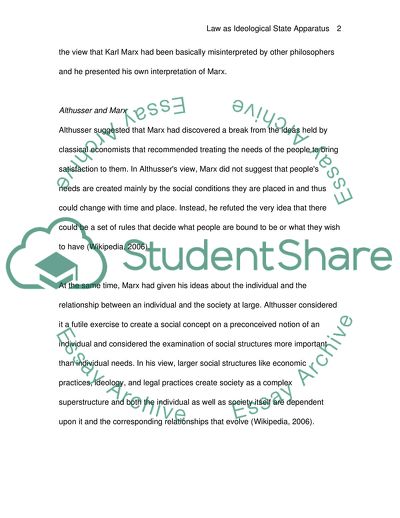Cite this document
(Law as Ideological State Apparatus Term Paper Example | Topics and Well Written Essays - 2750 words, n.d.)
Law as Ideological State Apparatus Term Paper Example | Topics and Well Written Essays - 2750 words. https://studentshare.org/law/1704451-1-what-does-it-mean-to-say-that-law-is-an-ideological-state-apparatus-2000-words-and-2-research-log-of-1000-words
Law as Ideological State Apparatus Term Paper Example | Topics and Well Written Essays - 2750 words. https://studentshare.org/law/1704451-1-what-does-it-mean-to-say-that-law-is-an-ideological-state-apparatus-2000-words-and-2-research-log-of-1000-words
(Law As Ideological State Apparatus Term Paper Example | Topics and Well Written Essays - 2750 Words)
Law As Ideological State Apparatus Term Paper Example | Topics and Well Written Essays - 2750 Words. https://studentshare.org/law/1704451-1-what-does-it-mean-to-say-that-law-is-an-ideological-state-apparatus-2000-words-and-2-research-log-of-1000-words.
Law As Ideological State Apparatus Term Paper Example | Topics and Well Written Essays - 2750 Words. https://studentshare.org/law/1704451-1-what-does-it-mean-to-say-that-law-is-an-ideological-state-apparatus-2000-words-and-2-research-log-of-1000-words.
“Law As Ideological State Apparatus Term Paper Example | Topics and Well Written Essays - 2750 Words”. https://studentshare.org/law/1704451-1-what-does-it-mean-to-say-that-law-is-an-ideological-state-apparatus-2000-words-and-2-research-log-of-1000-words.


